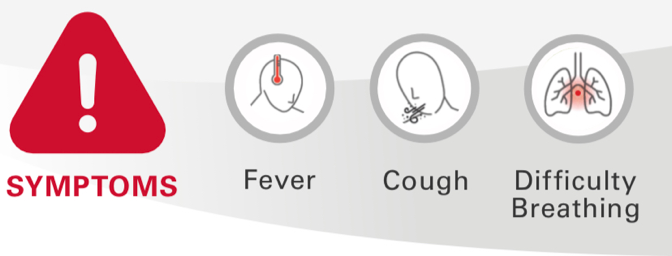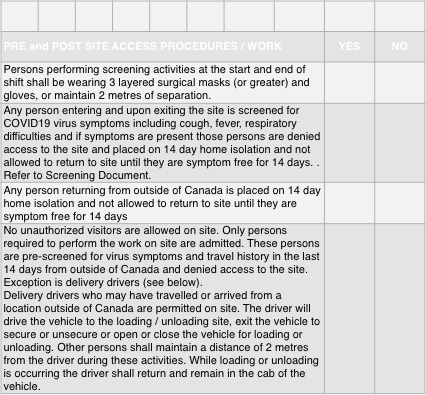Covid-19 Awareness Training
Know the Facts
Coronavirus Disease (Covid-19)
The following are the three common symptoms of Coronavirus Disease (Covid-19)

COVID-19 is most commonly spread from an infected person through:
- Respiratory droplets when you cough or sneeze;
- Close personal contact, such as touching or shaking hands;
- Touching something with the virus on it, then touching your eyes, nose, or mouth before washing your hands.
COVID-19 is not known to spread through ventilation systems or through water.
You can help protect yourself against the virus by:
- Washing your hands often with soap and water for at least 20 seconds;
- Avoiding touching your eyes, nose or mouth, especially with unwashed hands;
- Avoiding close contact with people who are sick;
- Coughing and sneezing into your sleeve and not your hands; and
- Staying home if you are sick to avoid spreading illness to others.
Source: https://bc.thrive.health/
What is AFDE doing to protect our workers?
- Conducting workplace risk assessments
- Increasing health and hygiene practices
- Practicing physical distancing
- Controlling site access
- Providing worker education and training
- Conducting audits/monitoring
Workplace Risk Assessment
- AFDE has conducted a Covid-19 Risk Assessment in anticipation for workers return. A safe work procedure (SWP) was created (assessing the risks of Covid-19 and controlling them).
- AFDE’s SWP meets and exceeds requirements/guidelines provided by BC’s public health officials for preventing transmission of Covid-19.
Increased Health and Hygiene Practices
- Increased hand washing and provision of hand washing stations.
- Enhanced cleaning and disinfecting of all common areas, shared tools, and frequently touched surfaces.
- Use of a third-party specialized cleaning company to disinfect and clean shared surfaces.
Physical distancing
AFDE is taking steps to ensure physical distancing during:
- Transportation to and from work (i.e., reduced seating capacity, one person per seat, and staggered seating);
- Working breaks (reduced lunch trailer capacity, staggered breaks, and one worker per table)
- Distancing during meetings and training
When physical distancing is not possible
AFDE understands that Physical distancing is not possible at all times while working on site. When physical distancing is not possible:
- Use PPE. Workers are required to wear a face cloth covering noses and mouths (options available: surgical masks, bandanas/neck gators, or face shield).
- Follow the Enhanced Cleaning Protocol (fogging).
- Even if distancing is not possible while you are working, you must maintain a 2-m (6 ft) distance if/when smoking during your break.
Controlling Site Access
Access to the work site is controlled through the following measures.
- BC Hydro administers gate access screenings to everyone before granting access to the site.
- AFDE will conduct a pre-screening questionnaire of all workers.
- AFDE Supervisors will conduct a daily Covid-19 fit for duty check.
- CDC requirements indicate that people staying in camp are to stay within the project site for the duration of their turnaround. This means that you cannot go into town.
Education and Training
- Prior to returning to site, all AFDE workers will review this Covid-19 Awareness Training and acknowledge understanding.
- When workers arrive on site they will be trained on the SWP (physical distancing, proper hygiene practices, monitoring and reporting illness, proper use of masks ,etc.)
- Toolbox talks/safety meetings will be used for ongoing reminders and training on Covid-19 related topics.
- Signage and posters that remind workers of the enhanced hygiene practices, physical distancing, sneezing/coughing etiquette will be posted around site.
Conducting Audit/Monitoring
Daily Self-assurance Audit: Daily audit forms will be completed to ensure that the extraordinary prevention measures required to be implemented, have been done.

What does AFDE expect from you?
Supervisor’s Responsibilities
- Distribute Personal Protective Equipment (PPE) and ensure its proper use by employees.
- Ensure only properly trained employees perform the work.
- Ensure employees under supervision follow established COVID-19 procedures. Work that is expected to be within close contact should not be assigned to workers who are at higher risk of complications due to COVID-19. This includes:
- Workers who are over the age of 60;
- Workers with chronic health conditions including diabetes, heart disease, and lung disease; and
- Workers who are immunocompromised.
- Only workers who are considered to be at lower risk of transmitting COVID-19 should complete work that is expected to be in close contact.
What does AFDE expect from you?
Worker’s Responsibilities
- Adhere to this Safe Work Practices when working in close contact with others.
- Report any problems, breaches, or if any symptoms are experienced (fever, cough, difficulty breathing) to your supervisor immediately.
- Use PPE as instructed or required.
- Face coverings are required when working within 6 feet (2 m) from other workers.
What to do if you experience any of the 3 symptoms?

What to do if you experience any of the 3 symptoms?
- Do not come to work.
- Report to supervisor.
- Call the Camp Clinic if at work or living in Fort St. John and 811 if at home in other areas of Canada.
- Supervisor to inform Safety Department.
- If already on site: Safety Department to transport worker to onsite clinic/camp/home, following the COVID-19 SWP.
- The Safety Department is to inform upper management.
Worker Transportation (buses/planes)
- MASKS ARE TO BE WORN ON ALL BUS AND PLANE TRIPS BY ALL OCCUPANTS
- Always practice social distancing.
- Operator/Drivers must ensure the bus, seats, and handrails have been sprayed down with disinfectant before leaving to the location to load passengers.
- Operators/Drivers will exit the bus first before loading any passengers and practice social distancing during the loading process.
- Passengers and drivers will be required to sanitize hands and wear face masks properly before boarding the bus.

- Passengers will begin seating at the very rear of the bus/plane first with one person per seat bench in a staggered pattern.
- Operator/Driver can board the bus once the last passenger has been seated.
- Upon arrival to destination the driver will exit the bus first and passengers to follow starting at the front seat first.
- Operator/Driver can enter the bus after all passengers have exited the bus and begin to properly spray disinfectant on the bus before leaving to another run.
Worker Transportation (buses/planes)
AFDE has been in communication with North Caribou Air, the provider of all charter flights from our flight hubs (Nanaimo, Vancouver, Kelowna, Calgary).
- Enhanced measures have been implemented to provide additional sanitization. This includes additional hand sanitizing stations, providing sanitary wipes to passengers, increased frequency of cleaning both the facility and the aircrafts.
- Cabin air filters have been maintained at the required frequency and are effective in the control of airborne contaminants.
- Physical distancing practices will be encouraged on the charter flights. Workers are required to seat themselves with adequate spacing from their fellow passengers (one seat between one another).
- Practice vigorous hygiene practices prior to boarding the plane (i.e. wash hands, utilize sanitizer, wear a mask).
AFDE has limited the use of light duty vehicles for the transportation of workers
- Where possible, AFDE will have one occupant per vehicle (the driver).
- If not possible, workers will wear a face covering (surgical mask/cloth mask/bandana/neck gaitor), and the total number of workers will not exceed the total number of seat belts available in the vehicle.
- For buses and crew vans, there will be one worker per row of seating, on the opposite side of the bus/van from the worker in the row ahead (diagonal seating).
- All vehicles must be cleaned regularly, including wiping down all surfaces and high touch-points (e.g., door handles, steering wheels, seats, and windows).
Camp Accommodations
Dining Room
As the most common area where multiple workers interact within the camp, ATCO has enacted the following to limit the risk of exposure.
- All workers are required to wash their hands prior to accessing the dining room.
- Dining room rearranged to limit seating to 50 people maximum, with 1 person allowed at each table. Tables have been separated to ensure a 2-m (6-foot) radius around each.
- Self-serve food options have been removed and are offered in pre-packaged servings or are distributed by ATCO personnel.
- As visual guidance, demarcations indicating a 2-m (6-foot) physical distance have been applied to the floor to keep personnel from encroaching on physical space of others within the dining room and food service lines. ATCO staff are additionally directing personnel within an even distribution of the two meal service counters.
- ATCO may employ designated eating times to ensure capacity is not exceeded. Designated eating times must be followed.
Camp Accommodations
Closure of Common Areas
The following areas within the worker accommodations have been closed:
- Spiritual room;
- TV room;
- Movie theater;
- Recreation rooms and gym;
- Games room;
- The Bean Café;
- Two Rivers Lounge; and
- Hair salon.
Recreation / Leaving Camp
As the recreation areas have closed, ATCO has worked to provide the following recreation options:
- In room fitness programs (full online access to over 100 programs).
- In room exercise program (designed by on-site fitness coordinators, available on channel 57.1).
- In room movies, played on a continuous loop, to be updated every 24 hours.
- Opening of outdoor spaces to be enjoyed while enacting physical distancing practices.
- CDC Regulations for industrial camps indicate that people staying in camp are not to leave the project site for the duration of their rotation.
- All employees MUST maintain 2-m separation while in smoking areas.
Thank you for reading through the awareness training.
We look forward to your return!
We know that this will be a challenge with the current circumstances. We thank you in advance for your patience as you acclimatize to our new working reality. This won’t work without your cooperation and acceptance.
Please take the quiz
YOU MUST ANSWER AT LEAST 4 OUT OF 5 QUESTIONS CORRECTLY TO COMPLETE THE TRAINING.
If you do not get a minimum of 4 out of 5 correct, you will need to re-read this training and retake the quiz.
